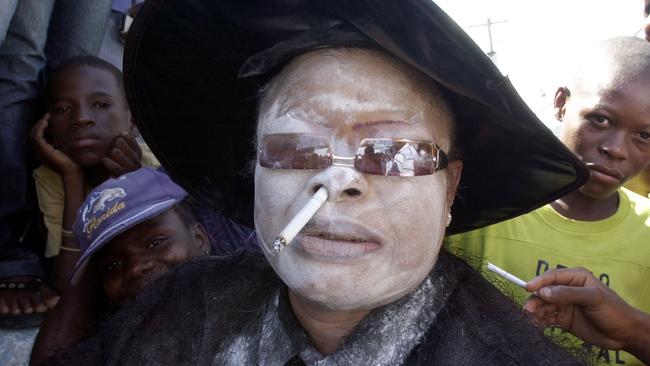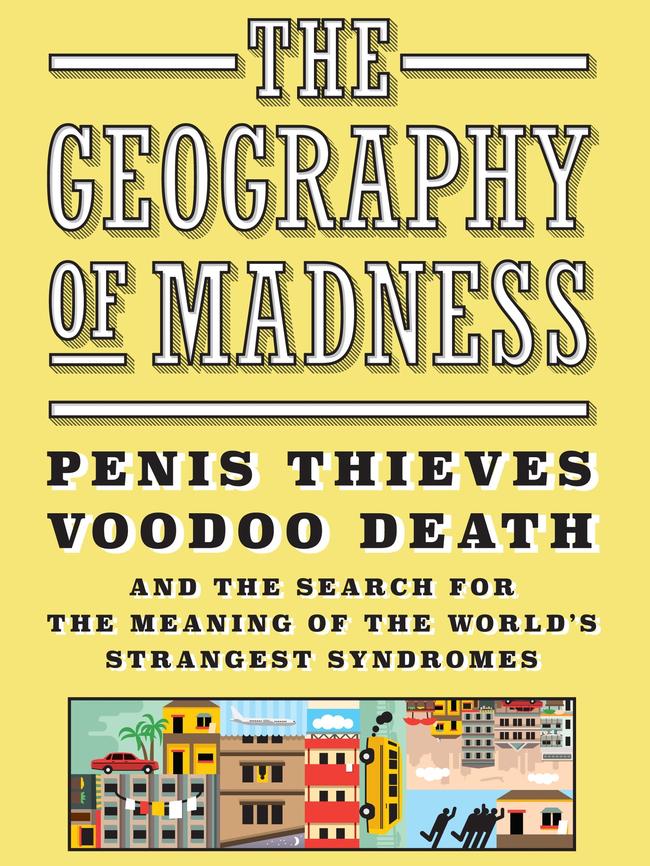From penis thieves to voodoo: Geography of Madness by Frank Bures
A deft American writer finds pathos in the world’s loopiest ideas, such as penis thieves and voodoo deaths.

The Geography Of Madness: Penis Thieves, Voodoo Death and the Search for the World’s Strangest Syndromes, by Frank Bures (Melville House, 256pp, $44.99, hardback)
At the centre of this book is a small question: why do some people suddenly start believing their genitals have been stolen?
Wrapped in this strange query is a much larger one, which American journalist Frank Bures has spent many years puzzling over: why do some cultures hold such strange beliefs, while others do not?
These questions take Bures from his home town in Minnesota to Nigeria, Hong Kong, China, Singapore, Thailand and Borneo. At its heart, The Geography of Madness is an incisive investigative yarn that interrogates what makes us human, and how the stories we tell each other can sometimes make us sick.
Bures explores the subject of koro — the overpowering belief that one’s genitals are retracting and will disappear — with genuine curiosity and earnestness.
In this approach there’s a touch of Fox Mulder from TV’s The X-Files: Bures wants to believe, or at least understand, the cultural loops in which his fellow humans travel.

There is no scoffing to be found here, and this tone suits the book well: a lesser writer, and a less mature man, might have simply written koro off as an affliction confined to primitive nations that have yet to adopt the Western medicine model wherein, as Bures writes:
We see our circulatory system as plumbing. We see the brain as a computer. We see our heart as a pump. We think of the body as a car — a metaphor that dates back to the 1920s, when cars first entered our lives. Likewise, we see the doctor as a mechanic, and illness as the result of a part breaking, which it’s the doctor’s job to repair. If something can’t be explained in mechanical terms, we tend not to believe it’s real. And yet, things are often more complicated than that.
As you read the above paragraph, you may find yourself nodding along to the sentiment. Why, yes, of course that is how the human body works: when something fails, we visit the mechanic for a tune-up in the form of conversation, diagnosis, prescription, expert instruction and treatment, perhaps in the form of sharp implements penetrating our bodily tissues to remove some disease. Consider, then, how strange this doctor-patient transaction would appear to a person raised in a different culture, where treatment often takes the form of carefully blended herbal medicine, rather than synthesised drugs or invasive surgery. They might think we’re crazy, just as we might think the same of them.
This difference of opinion cuts to the questions Bures has been turning over in his mind for his entire adult life, since he visited Italy as a bewildered exchange student in his late teens; now, at 44, he has published The Geography of Madness.
In a sense, he knows he is grappling with smoke by attempting to pin to the mat the precise nature of cultural differences. As he notes, ‘‘culture’’ is one of the most difficult words to define — in any language — and so his task here is enormous.
The journey, though, is a wondrous and eye-opening one, and the author captures his experiences with a spare style that immediately endears him to the reader.
“Much of what you’ll encounter in the pages that follow will seem impossible, or at least hard to believe,” he writes in the introduction. “As you read on, and as we travel together, I hope they will become more real to you as well, and that the lines between the real and the imagined, between the familiar and the foreign, begin to blur.”
Running parallel to this narrative of the author’s enduring curiosity about “how our ideas can kill us, how our beliefs can save us, and how these things quietly determine the course of our lives” is that of a young freelance writer slowly finding his way as a professional in an industry that requires unnatural reserves of optimism, persistence and self-belief.
Bures is not shy about documenting his early stumbles. “One of the reasons for my many failures as a young writer was that I thought that stories were just interesting things that happened,” he notes. He thought he could simply write about these interesting things and people would read what he wrote. It didn’t quite work that way: the problem was that Bures himself didn’t know, at that point, what his stories meant or why they mattered: “I had no idea what the causal links were, either within the story itself or to the larger world.”
Viewed in this light, The Geography of Madness is a resounding success, for it offers clear proof that the writer has learned from his early failings. After many years of thinking, reporting and documenting, he knows what this story means and why it matters.
It is written with the deft touch of one who has written many thousands of words before these, and structured with the skill of one who is now a master of telling stories in text.
What Bures has achieved here is a complex, nuanced and original meditation on our species and how we manage to coexist on a planet where we are all the same, yet each so different.
Andrew McMillen is a Brisbane-based freelance journalist and author. His second book, Skeleton School: Dissecting The Gift Of Body Donation, will be published in September.




To join the conversation, please log in. Don't have an account? Register
Join the conversation, you are commenting as Logout